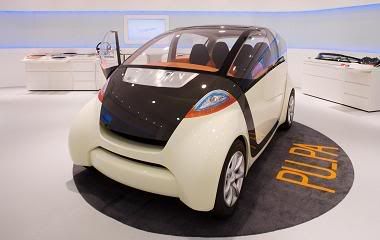The bioeconomy at work: Teijin presents lightweight car that contains bioplastics and biofibers

The firm plans to advocate the use of advanced materials, and predicts it can lighten a 1-tonne small to 500kg in five years, a move that will greatly improve fuel efficiency. Teijin also promotes materials that have a smaller environmental impact to produce.
Teijin materials in the PU_PA include a carbon-fiber backbone; a roof and exterior window of polycarbonate resin; heat-resistant bioplastic (Biofront); an artificial leather dashboard; a polyester film for the plated front grille; and tire cord fabric.
Teijin introduced the BIOFRONT bioplastic, which it developed with Mazda, in September (previous post). The plastic will be used initially for the manufacture of a high-quality, highly durable car-seat fabric made of 100% BIOFRONT fibers, and was featured in the new Premacy Hydrogen RE Hybrid vehicle that Mazda premiered at the 40th Tokyo Motor Show 2007:
 energy :: sustainability :: biomass :: bioenergy :: biofuels :: efficiency :: bioplastics :: biofibers :: bioeconomy ::
energy :: sustainability :: biomass :: bioenergy :: biofuels :: efficiency :: bioplastics :: biofibers :: bioeconomy :: BIOFRONT
Although bioplastics have attracted much attention due to their environmentally friendly nature, polylactide and other bioplastics currently on the market do not offer the same level of performance as oil-based plastics in terms of heat and shock resistance. Accordingly, the use of bioplastics has been limited so far.
In 2004, however, Teijin began researching bioplastics with Musashino Chemical Laboratory, Mutual Corporation and Professor Yoshiharu Kimura from the Kyoto Institute of Technology. The result was the development of an all-new type of heat-resistant bioplastic that was officially introduced in March 2006.
BIOFRONT incorporates technologies developed at Teijin Fiber's Matsuyama plant, including those to combine polymer from non-oil materials, such as starch, and those related to yarn production, such as fiber spinning and drawing.
The melting point of BIOFRONT fibers is 210ºC, significantly higher than the 170ºC melting point of polylactide fibers. As a result, BIOFRONT readily accepts high-temperature, high-pressure polyester dyeing. Such improvements have brought BIOFRONT to the same level of performance of PET (polyethylene terephthalate).
Fabrics for car-seat skins must satisfy stringent conditions demanded by automotive makers. As a result, polyester fibers have been used as the main material for car-seat skins, since conventional plant-based fibers are not capable of meeting all demands sufficiently.
Thanks to the convergence of the Teijin Group's polymer technologies and Teijin Fiber's yarn-production know-how, however, BIOFRONT fully satisfies the requirements for high quality and durability, including high heat resistance. Moreover, surface-treatment technologies for car-seat skins developed with Mazda have made it possible to develop a car-seat fabric that is 100% bio-based fibers.
Fiber, film and plastic resin applications
Teijin Group companies are focusing on additional applications for BIOFRONT fibers, films and plastic resins, where the heat-resistance of BIOFRONT is expected to be particularly useful in meeting demanding requirements for fabrication and actual use.
The following applications are envisioned in fields such as automotives, industrial materials and apparel textiles:
- Fibers: In-vehicle products, interior products and materials requiring heat-resistant, dye-affinity and anti-bacterial properties
- Films: Optical applications requiring transparency and heat resistance
- Plastic resins: Electric/Electronic parts and chassis requiring heat resistance and molding
References:
GreenCarCongress: Teijin Introduces Concept Car Made From Lightweight Materials - November 14, 2007.
Teijin: Teijin Launches BIOFRONT Heat-Resistant Bio Plastic - 100% BIOFRONT car seat fabrics developed with Mazda - September 12, 2007.
Biopact: The bioeconomy at work: Mazda develops 100% PLA based biofabric for vehicle interiors - September 12, 2007
 --------------
--------------
 Global Partners has announced that it is planning to increase its refined products and biofuels storage capacity in Providence, Rhode Island by 474,000 barrels. The partnership has entered into agreements with New England Petroleum Terminal, at a deepwater marine terminal located at the Port of Providence.
Global Partners has announced that it is planning to increase its refined products and biofuels storage capacity in Providence, Rhode Island by 474,000 barrels. The partnership has entered into agreements with New England Petroleum Terminal, at a deepwater marine terminal located at the Port of Providence.








0 Comments:
Post a Comment
Links to this post:
Create a Link
<< Home